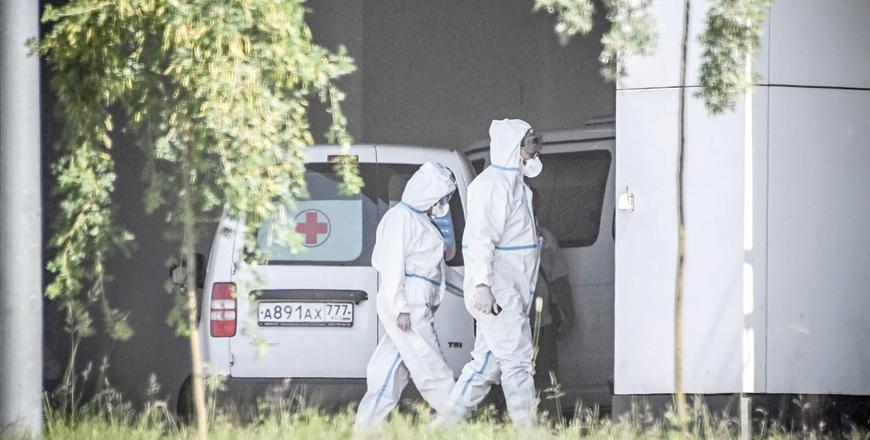- International News
- Sun-2021-06-20 | 02:39 pm

Nayrouz News Agency :
Russia's capital Moscow on Saturday reported a pandemic high for new coronavirus cases for the second straight day, as the city's hospitals were flooded with new patients due to the Delta variant.
The city registered 9,120 new coronavirus infections in 24 hours, according to government figures, a second consecutive high topping the previous day's total of 9,056 cases.
Those figures have ballooned from just 3,000 daily just two weeks ago, with Moscow Mayor Sergei Sobyanin saying the highly infectious Delta variant first identified in India represented nearly 90 per cent of new cases.
The new wave of infections came as Russia's second city of Saint Petersburg, the country's worst COVID hotspot after Moscow, is slated to host seven Euro 2020 matches, including a quarter-final on July 2, expected to draw thousands of European football fans.
Officials are now scurrying to reintroduce pandemic restrictions and roll out new beds dedicated to coronavirus patients.
On Monday, Saint Petersburg announced a tightening of restrictions including no food sales in its Euro 2020 fan zones.
Measures have been more drastic in Moscow, where Sobyanin on Friday shuttered the city's fan zone, banned gatherings of more than 1,000, suspended all mass entertainment events and closed dance halls.
The Russian moves come just over a month before the Tokyo Olympics.
The Japanese capital's governor said Saturday the city will cancel all public viewing events.
Rather than set up six planned viewing sites, "We will make greater use of the web to create exciting atmospheres for the Games," Yuriko Koike said.
'Eating up' beds
Moscow mayor Sobyanin has said the latest measures are necessary because the capital's hospitals were inundated with COVID patients within days.
On Thursday, he said that in just five days 13,000 free hospital beds had been "eaten up" and that the city has since expanded to 17,000 beds.
One of his deputies, Anastasia Rakova, said in a statement Saturday that Moscow would add another 7,000 beds over the next two weeks, bringing the total to 24,000.
Fear of the rapid spread of the Delta variant prompted the airport in the southern Chinese city Shenzhen to cancel hundreds of flights and tighten entry controls on Saturday, after a single restaurant employee tested positive.
Anyone entering the facility must show a negative virus test from the last 48 hours, Shenzhen Airport Group said in a statement on its official WeChat social media account.
In Uganda, President Yoweri Museveni announced new restrictions, including suspension of inland travel and an extended overnight curfew, as "the hospitals are full”.
"The rapid surge in the intensity of the pandemic appears unprecedented, but still manageable” with curbs similar to those employed at the beginning of the outbreak, Museveni added.
Mandatory jabs
In Russia, Moscow mayor Sobyanin extended closures announced last weekend of food halls in public spaces like malls, as well as overnight shuttering of bars and restaurants.
The city has also ordered mandatory vaccination for residents working in the service industry, saying some 60 per cent would have to be fully inoculated by August 15.
Although free jabs have been available to Russians since December, just 19.5 million out of a population of some 146 million have received at least one dose of a vaccine, according to the Gogov website which tallies COVID figures from the regions and the media.
In Moscow, only 1.5 million of the capital’s roughly 12 million people have been fully vaccinated.
A recent independent survey found that 60 per cent of Russians do not intend to be vaccinated.
Russia is among the countries hardest hit by the pandemic, with the sixth-highest number of cases in the world, according to an AFP tally based on official figures.
It overtook Britain on Thursday as the European country to suffer the most COVID deaths, reaching 128,911 by Saturday — although Kremlin critics argue the real figure is far higher due to undercounting by authorities.













